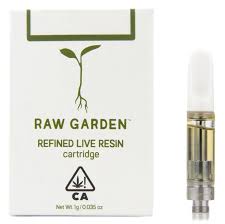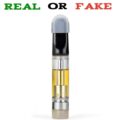Raw Garden products are made from 100% Cannabis with no additives or artificial flavors, unfortunately, like a lot of vape brands, underground producers are making fake, knock-off versions, which aren’t lab tested for quality or safety assurance. Fake THC carts are sending people to the hospital. An 18-year-old male patient showed up at NYU Winthrop Hospital in Long Island complaining about chest pain, nausea, fever, and shortness of breath. Initially, doctors thought he had pneumonia, due to his X-rays showing “haziness” in the lungs. Within 48 hours, says Melodi Pirzada, chief of pediatric pulmonology at the hospital, the patient’s condition worsened and he was sent to the ICU. There he was diagnosed with ARDS, a condition associated with acute lung injury. He was connected to a breathing tube and placed in a medically induced coma for one week.
The doctors were baffled as to how a healthy 18-year-old could become so sick until the patient’s mother showed up at the hospital with something she’d dug up from her son’s wastebasket. It was a vaporizer cartridge with the label TKO Extracts, a licensed company based in California that sells THC products; the cartridge was later confirmed to be a counterfeit version of the company’s product.
Across the US, there have been 2,172 (as of November 13, 2019) cases of e-cigarette, or vaping, product use associated with lung injury (EVALI) as reported by the Center for Disease Control (CDC). This statistic, along with the 37 deaths that have been reported, has led the CDC to launch an investigation into the source of this epidemic. After laboratory testing of patients with EVALI, the CDC found vitamin E acetate in all samples. This data, corroborated with other research done by the New York Department of Health, solidifies vitamin E acetate as the central maleficent component in black-market cartridges. Alex had no idea what was in his cartridge and it was most likely not vitamin E. He is extremely lucky that it wasn’t.
Vitamin E acetate is a lipid (oil) commonly found in cosmetics but is used as a cutting agent in cartridges for its color and viscosity, according to the CDC. Although the chemical is considered safe in makeup, the combustion and inhalation of it coats pulmonary tissue and saturates macrophages (immune cells). These engorged white blood cells, although normally integral to the body’s natural immune response system, start to attack lung tissue, inducing respiratory illness.
However, before we look at how to identify a fake Raw garden vape cartridge, it is important that we take a holistic look at the health effects of THC. Marijuana can be used in some states for medical reasons, and in some areas, recreational use is legal as well. No matter how you use marijuana, the drug can cause immediate and long-term effects, such as changes in perception and increased heart rate. Over time, smoking marijuana may cause chronic cough and other health issues. The effects of marijuana on the body are often immediate. Longer-term effects may depend on how you take it, how much you use it, and how often you use it. The exact effects are hard to determine because marijuana has been illegal in the U.S., making studies difficult and expensive to conduct.
But in recent years, the medicinal properties of marijuana are gaining public acceptance. As of 2017, 29 states plus the District of Columbia have legalized medical marijuana to some extent. THC and another ingredient called cannabidiol (CBD) are the main substances of therapeutic interest. The National Institutes of Health funded research into the possible medicinal uses of THC and CBD, which is still ongoing. With the potential for increased recreational use, knowing the effects that marijuana can have on your body is as important as ever. Read on to see how it affects each system in your body.
Respiratory system
Much like tobacco smoke, marijuana smoke is made up of a variety of toxic chemicals, including ammonia and hydrogen cyanide, which can irritate your bronchial passages and lungs. If you’re a regular smoker, you’re more likely to wheeze, cough, and produce phlegm. You’re also at an increased risk of bronchitis and lung infections. Marijuana may aggravate existing respiratory illnesses, such as asthma and cystic fibrosis. Marijuana smoke contains carcinogens, so it may increase your risk of lung cancer too. However, studies on the subject have had mixed results. According to the National Institute of Drug Abuse (NIDA), there is no conclusive evidence that marijuana smoke causes lung cancer. More research is needed.
Circulatory system
THC moves from your lungs into your bloodstream and throughout your body. Within minutes, your heart rate may increase by 20 to 50 beats per minute. That rapid heartbeat can continue for up to three hours. If you have heart disease, this could raise your risk of a heart attack. One of the telltale signs of recent marijuana use is bloodshot eyes. The eyes look red because marijuana causes blood vessels in the eyes to expand.
THC can also lower pressure in the eyes, which can ease symptoms of glaucoma for a few hours. More research is needed to understand the active ingredients in marijuana and whether it’s a good treatment for glaucoma. In the long term, marijuana has a possible positive effect on your circulatory system. Research isn’t conclusive yet, but marijuana may help stop the growth of blood vessels that feed cancerous tumors. Opportunities exist in both cancer treatment and prevention, but more research is needed.
Central nervous system
The effects of marijuana extend throughout the central nervous system (CNS). Marijuana is thought to ease pain and inflammation and help control spasms and seizures. Still, there are some long-term negative effects on the CNS to consider. THC triggers your brain to release large amounts of dopamine, a naturally occurring “feel good” chemical. It’s what gives you a pleasant high. It may heighten your sensory perception and your perception of time. In the hippocampus, THC changes the way you process information, so your judgment may be impaired. The hippocampus is responsible for memory, so it may also be difficult to form new memories when you’re high.
Changes also take place in the cerebellum and basal ganglia, brain areas that play roles in movement and balance. Marijuana may alter your balance, coordination, and reflex response. All those changes mean that it’s not safe to drive. Very large doses of marijuana or high concentrations of THC can cause hallucinations or delusions. According to the NIDA, there may be an association between marijuana use and some mental health disorders like depression and anxiety. More research is needed to understand the connection. You may want to avoid marijuana if you have schizophrenia, as it may make symptoms worse.
When you come down from the high, you may feel tired or a bit depressed. In some people, marijuana can cause anxiety. About 30 percent of marijuana users develop a marijuana use disorder. Addiction is considered rare, but very real. Symptoms of withdrawal may include irritability, insomnia, and loss of appetite. In people younger than 25 years, whose brains have not yet fully developed, marijuana can have a lasting impact on thinking and memory processes. Using marijuana while pregnant can also affect the brain of your unborn baby. Your child may have trouble with memory, concentration, and problem-solving skills.
Digestive system
Smoking marijuana can cause some stinging or burning in your mouth and throat while you’re inhaling. Marijuana can cause digestive issues when taken orally. For example, oral THC can cause nausea and vomiting because of the way it’s processed in your liver. It may also damage your liver. Conversely, marijuana has also been used to ease symptoms of nausea or upset stomach. An increase in your appetite is common when taking any form of marijuana, leading to what many call “the munchies.” This is considered a benefit for people being treated with chemotherapy for cancer. For others who are looking to lose weight, this effect could be considered a disadvantage.
Immune system
THC may adversely affect your immune system. Studies involving animals showed that THC might damage the immune system, making you more vulnerable to illnesses. Further research is needed to fully understand the effects. READ: CBD Syrup: Benefits, High, Side Effects, Legality
How to Spot Fake Raw Garden Cartridges
Fraudsters aren’t just manufacturing fictitious brands and potentially toxic products, they’re also putting out fake versions of popular brands. Websites sell packs of 100 empty glass tank carts along with counterfeit labels that mimic the legal cannabis brand Cookies all for just miserly price.
From cannabis industry professionals to testing lab experts, to consumer affairs and public health agencies, everyone reiterates the point that products from the legal market is likely to be safer given factors like increased accountability and the rigorous testing required by state law.
While there are no foolproof methods (even well-regulated markets sometimes have recalls), there are many ways to reduce the risk of consuming a contaminated fake product. You can further reduce harm by;
Checking the Raw Garden Cart packaging: While shopping in regulated markets is key, you can also check the product packaging to see if anything looks fishy. Labels on products in the regulated market should all display:
- A manufacturing date
- A packaging date
- A batch number
- A lot number
In order to be considered a legal cannabis product, each state has its own set of regulations that dictate what must be printed on the box, like lab results and THC concentrations. Similar to a price tag, legal brands will usually print a sticker that is stuck onto the finished product. Lab tests are certain to vary with each batch, so packages or products will have stickers presenting their most current and up-to-date lab test information; it should never be printed directly onto the box.
This information is provided by Public health Nigeria for informational and Harm Reduction purposes. We do not promote smoking or other activities that are harmful to health. Harm reduction (THR) is a public health strategy to lower the health risks to individuals and the wider society associated with using tobacco products. It is an example of the concept of harm reduction, a strategy for dealing with the use of drugs. Tobacco smoking is widely acknowledged as a leading cause of illness and death, and reducing smoking is vital to public health. ALSO SEE: How to Spot Fake Rove Cartridges







